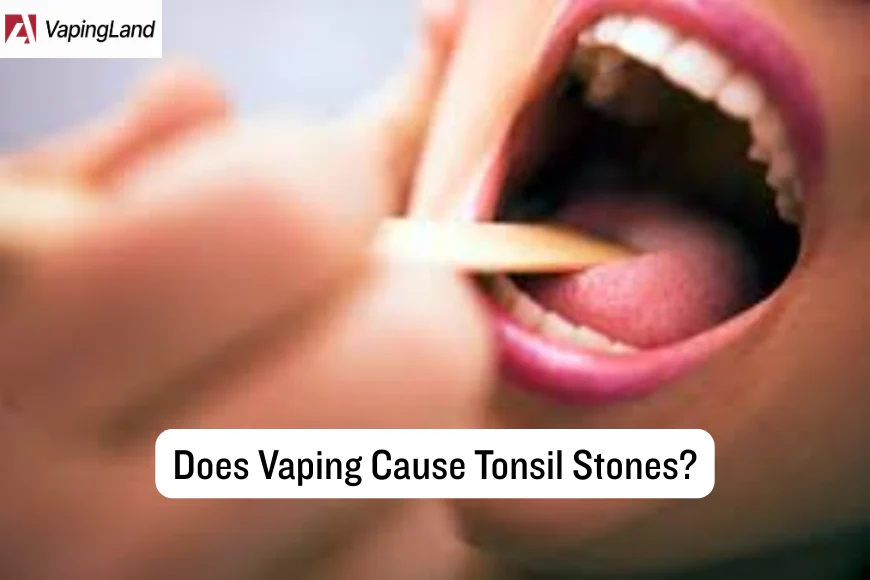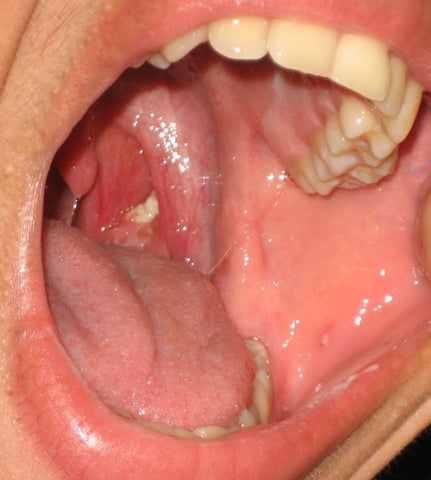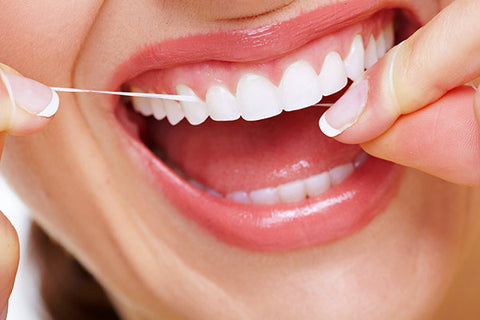Does Vaping Cause Tonsil Stones?

To be sincere, aerosols expose you to pretty many oral and cavity health issues, including tonsilloliths. But, not everyone who uses aerosols is bound to experience such health conditions—individual body system differences play a huge role in these things. Similarly, although vaping is generally a safer and healthier option than traditional cigarettes, the act is not recommended to people with nicotine allergy and other conditions alike.
Tonsil stones, medically called tonsilloliths, are a medical condition from compiled bacteria or debris on the back of one’s throat. This is not essentially caused by chain vaping or seldom vaping, but results due to a plethora of “common causes.” In this article, we will look into the tonsilloliths and how possibly vaping could cause the condition to emerge.
What Exactly are Tonsil Stones?
First things first, let’s understand what tonsil stones are all about. Tonsilloliths, commonly called tonsil stones, are calcified deposits of debris, bacteria, dead cells, and mucus lodged within the crypts of the palatine tonsils. Although the condition doesn’t pose any instant harm, it can lead to constant bad breath and sour throat. These stones may appear in the form of microscopic granules, but there are cases where the stones may weigh over 40g.

Causes of Tonsil Stones
The formation of these stones can be pointed to a lot of causes, but here are the primary etiological factors:
· Poor Oral Hygiene: Not usually removing food particles after eating, which can lead to bacterial buildup in the tonsillar crypts
· Chronic Sinus Issues & Post-Nasal Drip: Mucus Overproduction
· Dehydration & Dry Mouth: Reduced salivary flow can lead to calcification.
· Anatomical Predisposition: Deep crypts or enlarged tonsillar tissues, often genetically determined.
Does Vaping Cause Tonsil Stones?
The simple answer? YES, vaping can cause tonsil stones, but not directly. Vaping may cause tonsil stones because the act can cause throat irritation and contribute to bacteria overgrowth in the mouth, due to the ingredients used in making the e-liquids.
Propylene glycol (PG), one of the primary ingredients in e-liquids, contains hygroscopic properties that can desiccate oral mucosa. Also, reduced saliva volume due to chain vaping can compromise mechanical oral cleansing, causing more debris to stay and stockpile in the tonsillar crypts.
More so, aerosols in general may shift microbial homeostasis; scientific studies show that changes in bacterial community structure caused by aerosols may favor species that lead to calcification processes.
So, in essence, it’s not essentially about vaping or the type of vapes used, but more about the content of the e-liquid and nic-salt being vapes, and also about the personal oral hygiene of the vaper. These trajectories mentioned here, collectively support the hypothesis that vaping can act as a co-factor in tonsillolithiasis.
Can You Vape with Tonsillitis?
If you already have tonsil stones, it is best to stay away from vaping for a while, and the reasons are much apparent. To start with, tonsillitis—acute inflammation of the tonsils—is symptomized with throat pain, and erythema, and is often followed by infections. So, vaping while you’re already diagnosed with this condition may intensify the symptoms, leading to:

· Increased irritation further aggravates the inflamed mucosa, prolonging recovery time.
· Nicotine has vasoconstrictive effects that may impair local immune cell trafficking, potentially worsening infection severity.
Conversely, there is a singular case report of a never-smoker whose chronic tonsillitis resolved after transitioning to vaping; however, this is an isolated observation and does not constitute generalizable evidence.
Can Vaping Make Tonsil Stones Worse?
Apparently, yes. If your style of vaping contributes to constant dehydration, microbiome dysbiosis, and tissue irritation, it’ll logically intensify tonsil stone formation and retention—even forming larger stones.
Can Vaping Increase Tonsil Stones?
It is argued—even though published on Wikipedia—that up to 10% of the global population experiences tonsillolithiasis (tonsil stones), and some blogs report that the more majority of “heavy vapers” face this health challenge. None of these have been vetted to be totally true, but, it cannot be denied that vaping can lead to quite a number of health conditions, depending on the individual practicing the act.
What about Smoking?
Yes, smoking can also cause tonsil stones in similar ways as vaping does. This is because cigars contain nicotine, as well as other chemical components, which can cause dehydration and poor saliva formation, thus, leading to tonsil stone formation.
Why Does Vaping Cause Tonsil Stones?
The PG and nicotine’s diuretic properties in vape liquids tend to diminish saliva output, and this can cause more amount of debris to pack up in the tonsillar crypts, which over time, may lead to tonsil stones formation.
However, for vapers who don’t have any underlying health issues and keep to healthy oral hygiene, it will be almost impossible for them to develop tonsil stones as a side effect of vaping.
As mentioned earlier, there is no authentic study that proves someone got diagnosed with tonsil stones simply because they vape, regardless of the frequency. However, certain persons may likely develop irritations and a couple of other concerning symptoms, which, if not treated immediately, could further lead to severe conditions, including chronic tonsil stones.
Why Do I Suddenly Get a Lot of Tonsil Stones?
Most likely, the pointers have been there—you just weren’t paying attention to the signs. Notwithstanding, the sudden development of tonsil stones can be linked with certain behavioral and physiological changes:
· New or Increased Vaping Frequency: Pushing more limits with your e-liquid intake may intensify mucosal dehydration, which is a pointer to tonsil stone formation.
· Seasonal Allergies or Sinusitis: Heightened post-nasal drip loads the oropharynx with mucus and debris.
· Dietary Shifts: High-sugar or dairy-rich diets can improve bacterial substrate availability.
If you can track these things, you can eliminate the root cause of tonsil stones and be free from the health condition.
Will Quitting Vaping Get Rid of Tonsil Stones?
Well, not really. But you see, abstention from vaping can actually address two primary drivers of tonsilloliths: lack of sufficient saliva and microbiome disruptions. Now, with that—with your saliva volume rebound and microbiome rebalancing—within days to weeks of cessation, you might start to notice a little relief from the signs of this condition, while working on your therapy or medications to achieve wholesome recovery because pre-existing stones may remain lodged until medically discharged or treated.
So, practically, quitting vaping is more of a crucial first step to getting rid of tonsil stones, and must be paired with clinically suggested oral hygiene interventions for optimal resolution.
How to Permanently Stop Tonsil Stones?
There is no general rule of thumb for this; it all depends on what caused the tonsil stones and recommendations from a licensed medical practitioner. The procedure usually follows a multi-tiered strategy as highlighted below:
1. Behavioral Optimization: This involves increasing your daily water intake to maintain substantial saliva production and flow, as well as cessation from using aerosols or any nicotine-based product, including gums and pouches.
2. Oral Hygiene Intensification: This may include monitored mechanical clearance to biofilm formulation. You may further be asked to use saline or chlorhexidine rinses to reduce anaerobic bacterial load.
3. Medical & Surgical Options: For large tonsil stones, you may be subjected to surgery to manually extract the large or symptomatic stones. For stubborn, recurrent tonsillolithiasis, complete tonsil removal may be done.
Of course, everyone won’t get the same treatment plan, and so, it’s best to talk with your doctor and get a tailored plan for your condition.

Preventive Tips
· Stay hydrated always, especially if you notice your tongue is often dry of saliva.
· Maintain good oral hygiene, overall.
· Gargle after eating; it will help to remove food residue that may want to build up in your mouth or throat.
· Keep up with regular health checkups.
Summary
In conclusion, while direct causality between vaping and tonsil stones has yet to be conclusively established, substantial evidence indicates that vaping acts as a significant co-factor in tonsillolith formation and exacerbation. Also, quitting vaping won’t heal tonsil stones if you already have them; you must work in hand with a licensed medical practitioner to draft a workable plan for your recovery. Tonsil stones are not that much daring but can be if not handled properly and allowed to intensify. Hopefully, this article provided sufficient resources for you to understand the causes, symptoms, and cures of tonsilloliths (tonsil stones).















